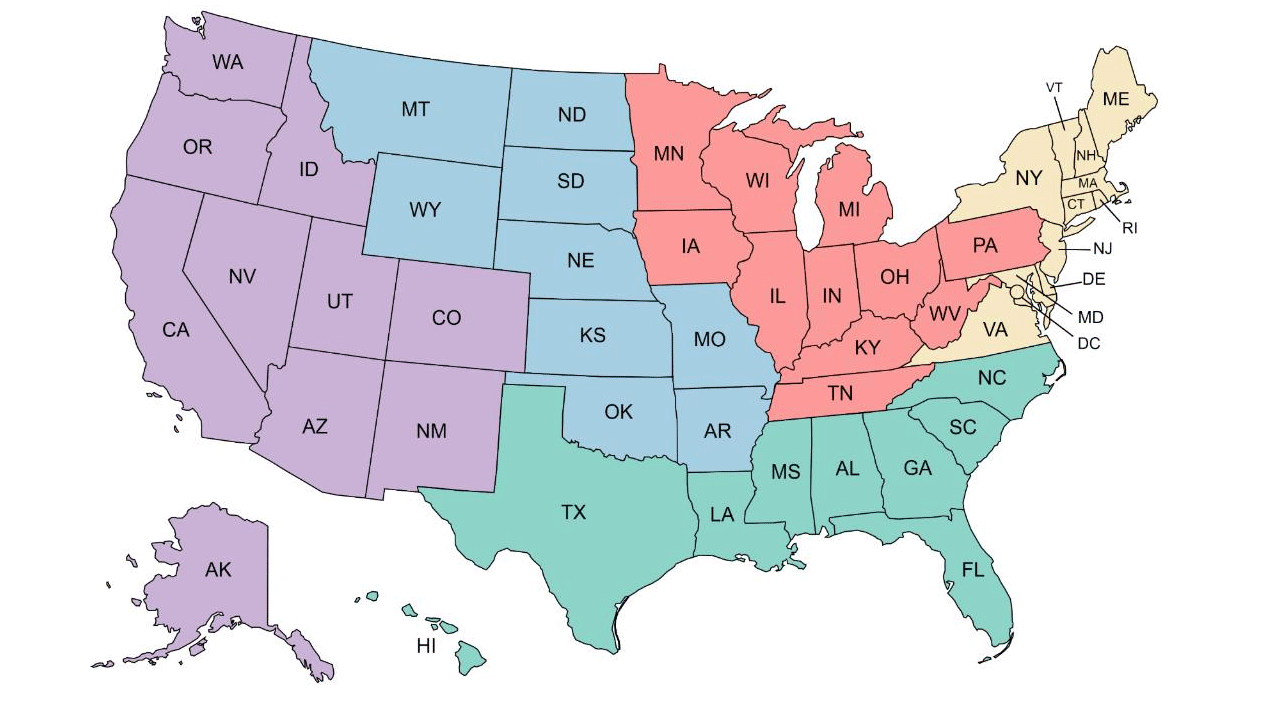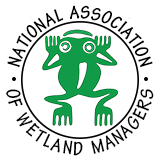NAWM, in partnership with the Association of State Floodplain Managers (ASFPM), is engaged in a cooperative agreement with the U.S EPA to develop and host a series of five regionally focused trainings to advance the integration of Clean Water Act programs with natural hazard mitigation programs. The focus of the training is on integrating these programs to improve interagency planning and implementation of co-beneficial projects that reduce flood risk and improve water quality, among other benefits.
These trainings will be held once a year (starting in 2023) and will be delivered to a different regional cohort, delineated in the map below:

2023: Cohort 1: Great Lakes/ Midwest area (Red) - Completed
September 12-13th, Andrew W. Breidenbach Research Center, Cincinnati, OH
2024: Cohort 2: Southeast (Green) - Completed
January 21-23, 2026 (Rescheduled from November 13-15, 2024), Guana Tolomato Matanzas National Estuarine Research Reserve, Ponte Vedra Beach, FL
2025: Cohort 3: West (Purple) - Completed
September 16-18th, EPA Region 8 Office, Denver, CO
2026: Cohort 5: Great Plains (Blue)
2027: Cohort 4: Northeast (Yellow)
NAWM and ASFPM have a goal for each regional cohort to include representative pairs from 9 communities, 9 states, and 2 Tribes. Although not pictured on the map above, U.S. territories will be included in this project with the regional cohort shown in green and can recommend communities located within their territorial boundaries. The state and territory pairs will be from the same state or territory in which the local community is located to facilitate relationship building. We anticipate that we will reach participants from 45 states and 10 Tribes. This is a "by invitation only" training, however, we are inviting nominations from interested communities and agencies.
In addition to the five training workshops, there will be quarterly cohort calls and a ten-part webinar series on associated topics. The webinar recordings, materials and tools created for the training workshops, along with other information and resources on best practices, lessons learned, and relevant case studies will be posted online as they become available.
If you are interested in having your community participate in an upcoming training, please click here.
Invited communities will:
- Attend one training workshop the year their regional cohort is the focus of the project
- Learn about collaboration opportunities to plan and implement projects focused on nature-based solutions with multiple benefits between programs
- Connect with other states and communities in their geographical area to discuss ideas and build a community of practice
- Participate in the quarterly project cohort call series to share our progress and continue to cover emerging issues
- Be eligible to receive up to 12 Continuing Education Credits (CECs) towards CFM renewal requirements
FREQUENTLY ASKED QUESTIONS
Who should be nominated?
Any community or tribe interested in participating. Note, even if your regional cohort will not be engaged for a few years, you can nominate yourself at any time. We will keep a running list.
Are there any requirements for nominated communities or tribes?
Yes, because the goal of this project is to build cross-sector, cross-government relationships, one water resources-related manager and one emergency manager from the community or tribe must be committed to attending the training workshop and participating in the cohort calls. Note, if a community is too small to have a water resources-related manager, they can pull in someone from a local or regional organization to fill that role.
How can I nominate a community?
Please fill out this Interest Submission Form
When are nominations due?
NAWM and ASFPM will start to process nominations for each year’s community selection in March but will still accept nominations on a rolling basis until the invitation list is complete.
How will invitees be selected from the list of nominated communities?
To narrow down the list of nominated communities, states, and tribes to those most in need of a training like this, we will compare our list against other notables lists, such as:
- FEMA’s list of communities with active hazard mitigation plans;
- GAO’s list of EPA superfund sites that are at risk of flooding, storm surge, wildfires or sea level rise;
- the White House’s Climate and Economic Justice Screening Tool (CEJST) tool;
- EPA’s EJScreen Mapper.
When will teams be notified of their selection?
For the first cohort, NAWM will send out invitations to selected communities and tribes beginning in March of each year.
What costs should teams anticipate needing to cover to attend the workshop?
There is no registration fee associated with the workshop, but participants should expect to cover the cost of their travel, meal, and/or lodging.
NAWM has secured limited funding to partially offset these travel costs. Individuals in need of travel support will be asked to complete a request form and will be awarded support based on need. If everyone were to submit a request, travel support is expected to amount to around $500 per person for each workshop. Costs will be reimbursed after the event upon submission of receipts.
